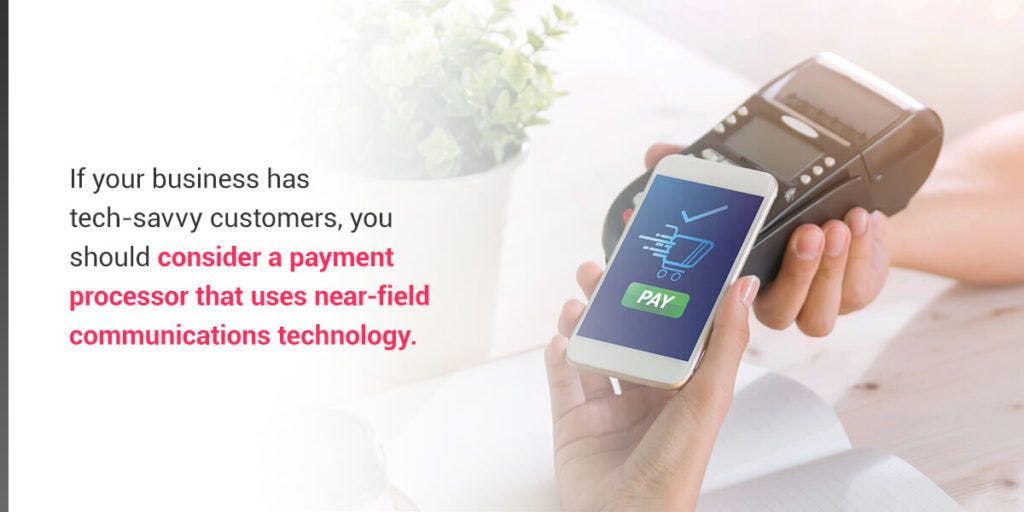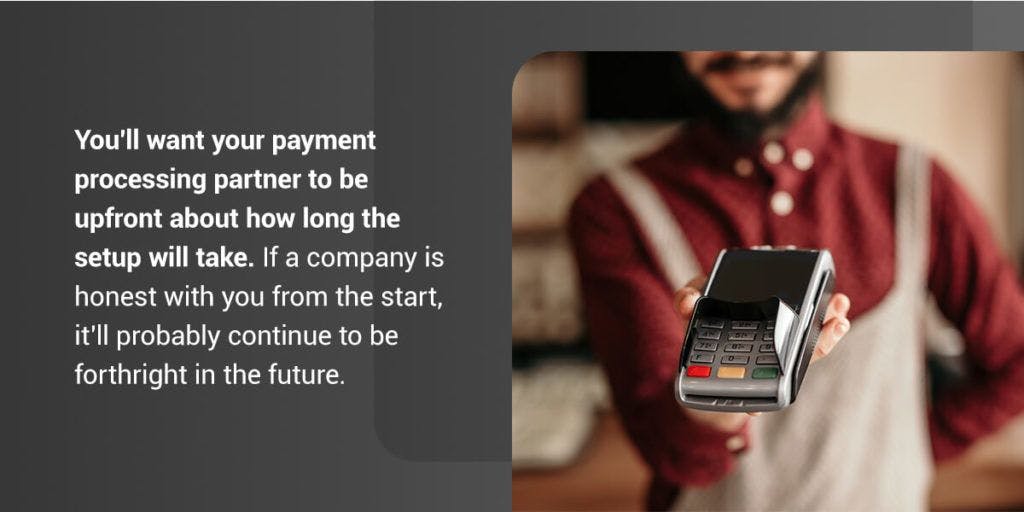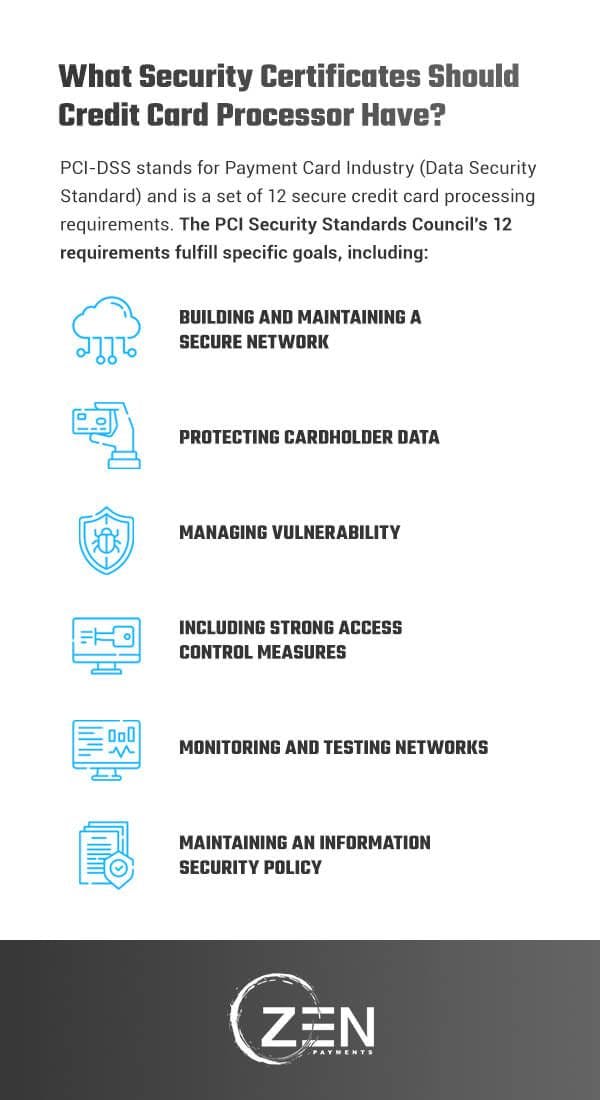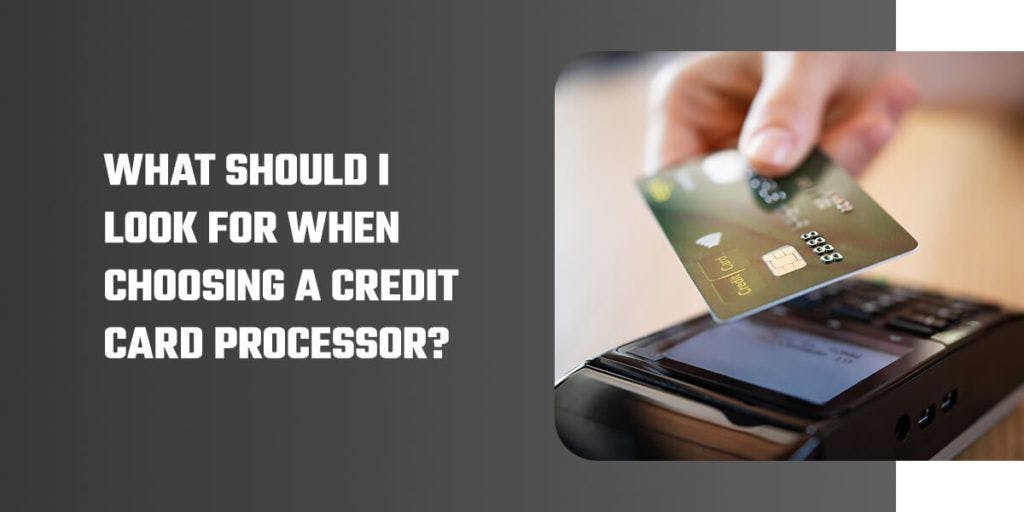If your company is looking to accept credit cards, you’ll need to work with a credit card processor to help your company securely accept payments. While a basic credit card processing company is sufficient for some companies, many others require a payment processor that offers specialty services. Choosing a credit card processor can prove to be a difficult task.
For example, suppose banks and payment processors like Stripe and PayPal put your business in the high-risk category. In that case, you’ll need to work with a company specializing in high-risk payment processing solutions. Regardless of your industry, you should thoroughly research to choose the best credit card processing company for your specific needs.
When figuring out how to choose a credit card processor, you’ll want to consider multiple factors, including the payment types they accept, their fees, the software and equipment setup, their customer support, their security qualifications and whether they specialize in working with high-risk businesses. Choosing a credit card processor can be a difficult task, luckily we have some things to help you get started.

What Are the Accepted Payment Types?
Today’s customers want choice in how they pay for your products and services. Payment processors want to know how their customers pay to build a stronger relationship with you, the customer. If you run an e-commerce business, most of your customers will probably pay with a credit or debit card or other online payment systems. However, because both high-risk and online merchants experience more fraud, you must choose a reliable credit card processor.
You’ll want to accept as many customer credit cards as possible, so the best credit card processing services will allow your business to accept all major debit and credit cards. If you have a brick-and-mortar retail site, customers should be able to swipe, insert or tap their cards to pay. The most secure processing equipment accepts EMV chip cards. You might even want to consider choosing a system that accepts prepaid cards and gift cards.
You should also consider your industry when thinking about the payment types your credit card processing company should accept. If your business has tech-savvy customers, you should consider a payment processor that uses near-field communications technology. That way, you’ll be able to accept payments from digital wallets like Apple, Samsung or Android Pay, where customers can make payments via their smartphone.
How Much Are the Fees and Other Costs?
When choosing a credit card processor or other merchant account services, you’ll want to consider the fees associated with using their services. Payment processing companies charge both flat and processing fees. Examples of flat fees include recurring, terminal or network access costs. On the other hand, a credit card company will charge you a processing fee when a specific action occurs. Processing fees include cancellation, monthly minimum or liquidated damages fees.
Typical fees a payment processing company include:
- Application and setup fees: You might have to pay a fee for a credit card company to process your application. Sometimes, companies will also charge fees to set up the equipment that enables you to accept credit cards. When applying, you can also check out a company’s approval rating, which is the percentage of how many applicants the payment processor accepted. Higher approval ratings signal a company approves a higher rate of applicants, which typically means a lower application fee and higher processing speed.
- Interchange fees: Payment processing companies charge you interchange fees every time you process a transaction. The credit card processor will pay a fee of about 2-3% each transaction to the card-issuing bank. Interchange fee rates depend on if the transaction was done in-store or online, the type of card used and each transaction’s size.
- Monthly fees: A payment processor will charge you monthly statements and gateway access fees, which cover the cost of mailing your monthly statement. A payment gateway allows the processing system and credit card company to transmit transaction data securely. Some credit card processors charge you a monthly fee to access their payment gateway.
- Monthly minimum fees: Credit card processors have to collect a minimum amount each month. If your business fails to meet or exceed this minimum monthly amount, you’ll have to pay the difference to the processing company.
- Early contract termination fees: Processors may charge you for early termination of your contract. This fee may be a couple of hundred to thousands of dollars. Review your contract to see if a payment processing company charges a termination fee.
Consider functions you might need beyond what a simple payment processor can offer, as specialty services might have different price options. For example, if you’re considering storing customer payment information to make repeat purchases easier or use a recurring subscription bill to charge cards regularly, you might need to select a specialty merchant service beyond what a basic credit card processor can offer.
Think about what type of cash flow tracking and reporting solutions you’ll need and whether you’ll need a mobile credit card processing solution like a mobile app. When choosing merchant services for your business, you’ll want to select a company that’s compatible with your business’s needs.

How Long Will the Setup Take?
When choosing a credit card processor, you should ensure that the setup will be simple and not cost your business valuable time and profit. Make sure you understand the entire setup process before choosing a credit card processor. Ask questions about how long integration will take, including how long it will take until your business is up and running with the payment processing system. Delays in setup and integration will take away from valuable time your company could use to convert leads and earn profit.
You’ll want your payment processing partner to be upfront about how long the setup will take. If a company is honest with you from the start, it’ll probably continue to be forthright in the future. A credit card processing company that’s straightforward with fees and installation time will most likely have superior customer service if anything goes wrong.
How Helpful Is Customer Support?
Even if you do your research and select the best credit card processor for you, problems are still bound to arise. Technology can sometimes be unpredictable, and you might have questions about statements or monthly fees. You’ll want to ensure the payment processor you choose has a dedicated customer support team. Ideally, the payment processor you work with should have 24/7 direct support from a live representative if you have questions or problems.
Help from an actual person will get you solutions faster. Reach out to a few credit card processors to inquire how they deal with customer service requests. You’ll get a solid impression of how a company deals with customer inquiries by reaching out to several companies before you select one.
You can also harness the power of the internet to find customer reviews on different credit card processors. Look for reviews from other customers when selecting the best credit card processor. Customer reviews can give you critical insights into whether a credit card processing company is responsive to customer service requests. You can also check out reviews from professional review companies to read reviews from experienced researchers.
How Is Their Security?
Your customers trust you with their credit card information, so you’ll want to ensure you choose a secure credit card processing company. However, you can also be a victim of credit card fraud — in 2019, 77% of businesses reported being a victim of digital payment fraud. High-risk industries typically experience higher fraud rates, so if your business is in one, you’ll want to ensure you’re working with a credit card processor that can work with you.
Ensure you’re securely accepting payments from customers, too. If your business frequently accepts cards in-person on a regular basis, an EMV chip card reader is the most secure way for customers to make payments. Because the card stores customer’s card information in a chip, bad actors have a more challenging time accessing and forging data than with magnetic strips.

What Security Certificates Should They Have?
Look for a credit card processor that supports SSL certificates and CVV2 verification for online payments. The processor should also be PCI-DSS compliant. PCI-DSS stands for Payment Card Industry (Data Security Standard) and is a set of 12 secure credit card processing requirements.
The PCI Security Standards Council’s 12 requirements fulfill specific goals, including:
- Building and maintaining a secure network: Processing companies can protect cardholder data by installing and maintaining firewall configurations and personalizing system passwords and other security parameters rather than using vendor-supplied defaults.
- Protecting cardholder data: Companies are expected to protect all stored cardholder data and encrypt the transmission of cardholder data across open, public networks.
- Managing vulnerability: The best credit card processors implement a vulnerability management program. They rely on anti-virus software and programs to develop and maintain secure systems and applications to prevent fraudulent activity before it happens.
- Including strong access control measures: Secure payment processing companies will also restrict cardholder access to data unless merchants absolutely need that information. To ensure only qualified employees access the computer, processing companies can also assign a unique ID to each individual who has computer access. Finally, payment processing companies can restrict physical access to cardholder data.
- Monitoring and testing networks: Credit card processors should regularly monitor and track access to all network resources and cardholder data to ensure their security measures are working. They can do this by periodically testing their security systems and processes to help you feel more assured your data is secure.
- Maintaining an information security policy: Finally, all payment processing companies should have an information security policy for employees and contractors. Companies should update this policy regularly as their security plan develops.
Regardless of how your business accepts credit cards, you must be PCI compliant. By staying compliant, you can earn and keep your customers’ trust by preventing fraud and significant security breaches. You’ll also have to complete a self-assessment questionnaire and pass an approved scanning vendor (ASV) scan to become an approved PCI-compliant vendor.
Do They Specialize in Working With Businesses in High-Risk Verticals?
You’ll also want to choose the best credit card processor for your particular business’s needs. To ensure a payment processor’s merchant services align with your business objectives, you’ll want to consider how your business accepts payments and whether payment processors consider it high-risk. One of the most important considerations when choosing between merchant services is whether your business requires an industry-specific payment processor.
Credit card processors typically classify merchants that use their services according to different risk levels. Some processors serve only low- or high-risk industries, so you’ll want to ensure you choose the best credit card processing company for you. A payment processor observes how well executives run the business, their customer fraud rates, how many customer chargebacks they experience and how regulated the industry is.
For example, businesses in high-risk industries have to consider additional factors when choosing merchant service, as they typically have more difficulty securing a merchant account service. Payment processing companies like Stripe and PayPal assume a certain level of risk when they accept a high-risk business for a merchant account, and they might drop your high-risk merchant account or freeze your funds — if they even accept your account in the first place. Therefore, you’ll need a high-risk payment processing partner to accept credit card payments securely.
Your business might be considered high-risk because of the following:
- Bad credit: Your bad personal credit can put your business in the high-risk category.
- High refund or chargeback rates: High refund and chargeback rates cause more work for banks. Higher chargeback rates might also suggest chargeback fraud, which is harmful to your business.
- Subscriptions, continuity programs and free trials: Customers might sign up for free trials with a business and forget to cancel, leading to higher chargeback rates.
- Controversial products or services: Processing companies might label industries like coaching and adult entertainment as high-risk because these industries might sell products and services that are expensive or controversial.
You’ll want to identify your risk level when choosing a credit card processor to select the best service for you. Save time and money by only partnering with processors that can serve your industry.
Contact Zen Payments to Speak With One of Our Expert Representatives
If your business is in a high-risk industry, you’ll want to ensure you choose the right payment processing partner for your needs. High-risk merchant services companies understand high-risk businesses require secure payment processing solutions.
At Zen Payments, we believe in no good merchant left behind. We specialize in high-risk merchant account services and offer payment gateways, chargeback assistance and fraud protection services to keep your merchant account running for your business’s lifespan. Contact us today to get a quote within 24 hours!





